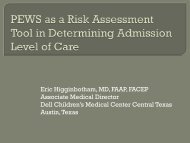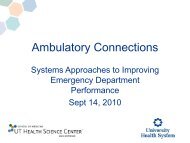COD E R E D
Download - Code Red: The Critical Condition of Health in Texas
Download - Code Red: The Critical Condition of Health in Texas
- No tags were found...
You also want an ePaper? Increase the reach of your titles
YUMPU automatically turns print PDFs into web optimized ePapers that Google loves.
insurers based on their amount of business in Texas. Premiums for Medicaid, Medicare andsmall group coverage are excluded from the assessment pool, as are ERISA plans. In 2003,the average monthly premium was $437, total claims paid were $171 million, and assessmentson 210 insurers brought in $62.6 million. Texas’ high-risk pool has more than 25,000 enrollees,making it one of the largest pools in the country. 245Benefits in the high-risk pool are similar to the benefits of an average individual insurance plan,covering inpatient and outpatient care, prescription drugs and other services. Participantsselect an annual deductible from $500 to $5,000, then monthly premiums are determined byage group, sex, residence in one of six areas of the state and whether the person uses tobaccoor not. Participants using the network pay 20 percent co-insurance up to an annual maximum of$3,000, and all enrollees have a lifetime maximum benefit of $1.5 million. 246To be eligible to enroll in the high-risk pool, a person must be a legal resident of Texas for atleast 30 days, and a U.S. citizen or a permanent U.S. resident for at least three continuousyears. Potential enrollees must show one of the following to qualify: 1) proof of refusal by aninsurer to issue health insurance to the person based on health reasons, 2) certification from aninsurance agent showing that the agent could not obtain coverage similar to the pool coveragedue to health status, 3) offer of coverage or a current policy that excludes one or more medicalconditions, 4) offer or current policy with substantially similar coverage to the pool but withhigher premiums, or 5) diagnosis of a qualifying medical condition such as cancer,cardiovascular disease or cerebral palsy. A person can also qualify if he/she is a legal Texasresident who has had health insurance for the previous 18 months (with no break more than 63days) if the coverage was through an employer-sponsored, church or government plan; whohad health insurance under another state’s qualified HIPAA program but lost coverage due tomoving to Texas, if the person applies for coverage in Texas within 63 days of losing previouscoverage; or if the person is eligible under the Health Coverage Tax Credit Program. (Thisprogram is part of the Trade Act of 2002 and helps workers displaced through foreign tradeobtain health insurance through a federal income tax credit; states have several options on howto implement this program and Texas chose its high-risk pool as the vehicle.) Spouses andchildren of people who qualify and enroll in the high-risk pool are also eligible. 247Incentives for Small GroupsThe Texas Legislature enacted group health insurance reforms in 1993, 1995 and 2003.Standard benefit plans and mandated benefits have changed over the years, as well as certainbenefits for small groups. In the 1990s, the legislature authorized the formation of public andprivate small employer purchasing alliances, as well as directing the state to establish astatewide purchasing pool. The Texas Insurance Purchasing Alliance was successful at first butended after five years due to various problems. New legislation would be needed to createanother statewide purchasing pool, but the law already allows privately sponsored pools to form.As of September 2004 there was currently only one active fully insured alliance in Texas, withabout 2,700 participants. Surveys carried out for Texas’ State Planning Grant activities showedthat 95 percent of small employers surveyed wanted some form of purchasing pool, and that 72percent did not know that Texas law already allows private pools. However, insurersinterviewed expressed little interest in participating and did not think that purchasing poolswould lower rates as much as expected. 248 In 2003 the legislature authorized a new kind ofpurchasing pool called a health group cooperative, which can be made up of both small andlarge employers, and for which insurers can be exempted from having to provide all the statemandatedbenefits. 249 As of March 2005, there was one health group cooperative registeredwith the Texas Department of Insurance, based in Dallas. 250C-11







